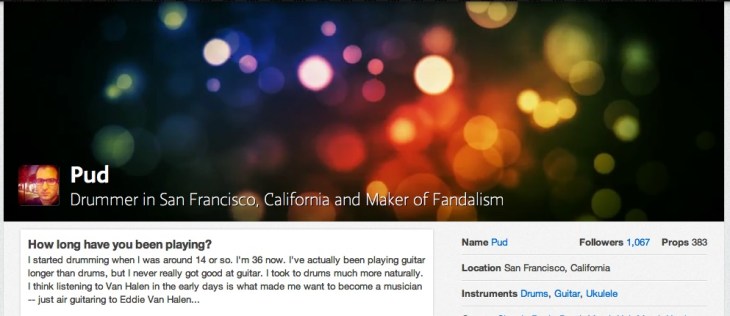If you’re wondering what Philip Kaplan, a.k.a. Pud, has been up to, wonder no longer: He’s working on a social network for musicians called Fandalism. The site went live at the end of January, and without any publicity or advertising, it has grown to more than 350,000 registered users.
You may remember Kaplan as the founder of the blog FuckedCompany and the ad network AdBrite. More recently, he co-founded social shopping startup Blippy, and when the product failed to take off (the other founders are working something new), he focused on smaller projects like newsletter-maker TinyLetter, which was acquired by MailChimp in August.
One thing you might notice: None of these projects seems particularly related to any others. And Fandalism continues that non-pattern. Kaplan says he has actually owned the URL for several years, at one point experimenting with using it as a “YouTube for songs.” He returned to the domain last year as a way to meet one of his own needs: He’s a musician (primarily a heavy metal drummer), and he wanted to connect with other musicians.
Right now, Kaplan says the main way for musicians to find other musicians online is through Craigslist. There’s also Indaba Music, which similarly promises to help musicians find each other, but it’s more focused on collaborating on specific projects. (The site describes itself as a “the music creation marketplace.”) Kaplan wanted to make something that was more social, and also fairly straightforward and simple.
When you create a profile on Fandalism, you enter basic information like where you’re located, the genres of music you play, and your influences. You can also answer questions about your musical history, such as “What was the first concert you went to?”, and share your work through photos, lyrics, and embedded YouTube videos and SoundCloud songs. Then, once your profile is set up, you can start following other members, posting comments on their profiles, giving “props” to their performances, and sending them private messages.
As an example, you can see Kaplan’s profile here.
Judging from the rapid, word-of-mouth user growth, it seems that other musicians also thought there was a need here. And it’s an international userbase — at one point during our demo, Kaplan started searching for musicians in random countries, and the only one that came up empty was Luxembourg. We even found someone in Kazakhstan.
The site was completely invite-only until earlier this week, when Kaplan opened it up a bit, allowing anyone to browse and search. However, you still need an invite from another member to create a profile and post — Kaplan says it’s a basic way to ensure that someone else is vouching for your talent as a musician, so he plans to keep membership invite-only for now. (You can also join as a non-musician, but you’ll need an invite for that, too.)
As for making money, Kaplan says he has some ideas, such as allowing instrument manufacturers to advertise on the site. However, he doesn’t sound committed to any particular model right now. Nor does he seem particularly interested in raising funding, though he doesn’t reject the idea outright, or in hiring any employees. Yep, Kaplan has reached hundreds of thousands of members with a solo project, and while that isn’t quite an Instagram-level user-to-employee ratio, he wouldn’t mind getting there someday.
“Being able to be one guy and have a site with potentially millions of users — you can only do that now,” Kaplan says. “I would like to have 10 million users and still be one person.”
